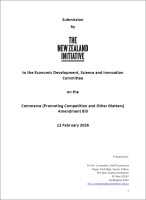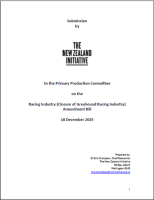Gambling on futures
Many pre-modern people believed gambling was bad and suppressed it. If you think about it, your life insurer is a bookie betting that you’re not going to die this year. Read more

Eric Crampton is Chief Economist with the New Zealand Initiative.
He applies an economist’s lens to a broad range of policy areas, from devolution and housing policy to student loans and environmental policy. He served on Minister Twyford’s Urban Land Markets Research Group and on Minister Bishop’s Housing Economic Advisory Group.
Most recently, he has been looking at devolution to First Nations in Canada.
He is a regular columnist with Stuff and with Newsroom; his economic and policy commentary appears across most media outlets. He can also be found on Twitter at @ericcrampton.
Phone: +64 4 499 0790
Many pre-modern people believed gambling was bad and suppressed it. If you think about it, your life insurer is a bookie betting that you’re not going to die this year. Read more
In this episode, Eric Crampton talks to Nick Clark about New Zealand's long and troubled history with the Resource Management Act — and whether the Government's 744-page replacement really fixes it. They examine the missing property rights protections, the absence of robust cost-benefit analysis, and the fail-safes needed to ensure the new framework delivers better outcomes for New Zealanders. Read more
No straight thing can be built of our crooked timber. We can and will err, even with best efforts and intentions. Read more

The furore over immigration settings in the trade deal with India provides an excellent reminder about a basic policy principle. You’ll have a hard time getting a policy right if you’ve misdiagnosed the problem. Read more
The coalition agreements that formed the government promised an important change to the Commerce Act. The Commerce Commission has always been able to take on traditional cartel arrangements: secret agreements where businesses divvy up a market, restrict output, and raise prices. Read more
Samuel Colt invented the revolver and a slogan to go with it. “God created men, Col. Read more

1. INTRODUCTION AND SUMMARY 1.1 This submission on the Commerce (Promoting Competition and Other Matters) Amendment Billis made by The New Zealand Initiative (the Initiative), a Wellington-based think tank supported primarily by major New Zealand businesses. Read more
In this episode, Eric talks to Oliver Hartwich about New Zealand's negotiations with the United States over rare earth minerals, following a 180-day ultimatum from America requiring allied nations to sign mineral access deals or face tariffs. They discuss the complications revealed in Australia's similar agreement, the implications for New Zealand's mining regulations and international relationships, and how this pressure from the US represents a fundamental shift away from the traditional rules-based international order. Read more
Think for a moment about how some pharmacy services are funded. Or rather, not really funded. Read more
Right now, Auckland Council’s zoning allows people to build about a million shops selling tasty pies. Tomorrow, someone could buy or lease a commercially-zoned site near you and turn it into a shop selling pies. Read more

This concluding episode examines what it takes for housing reform to endure. Minister Chris Bishop reflects on his journey to Competitive Urban Land Markets (CLM) and why housing affordability is best understood as a problem of land supply. Read more

INTRODUCTION AND SUMMARY 1.1 This submission on the Racing Industry (Closure of Greyhound Racing Industry) Amendment Bill is made by The New Zealand Initiative (the Initiative), a Wellington-based think tank supported primarily by major New Zealand businesses. In combination, our members employ more than 150,000 people. Read more
It tasted like a normal glass of milk. Maybe a little bit thinner than I would have expected for the 3 percent fat content advertised on the bottle. Read more
Every year around Christmas time, the government provides a sneak preview of the coming year's budget. At the same time, Treasury provides its take on the state of the books. Read more
In this episode, Eric, Nick and Benno talk about the Government's proposal to abolish regional councillors while retaining regional councils, shifting governance to new Combined Territories Boards made up of local mayors. They explore how this reform creates space for mayors to rethink regional governance through a function-by-function approach, potentially establishing purpose-built agencies for issues like water catchments and transport that cross council boundaries. Read more